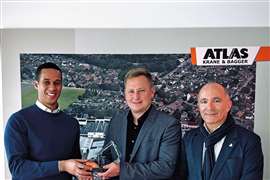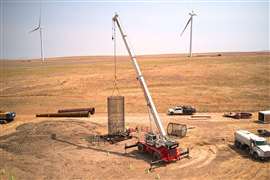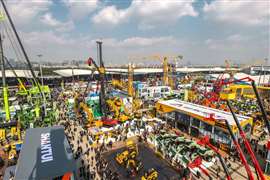IPAF to continue its push in North America says president Wayne Lawson
22 August 2011

The International Powered Access Federation (IPAF) looks to continue its push in North America and its new president, JLG’s Wayne Lawson, already has on his thinking hat. Lindsey Anderson spoke with Lawson recently and reports
Two years ago as he was exiting his term as president of the International Powered Access Federation, John Ball reflected on his proudest achievement during his Federation stint - putting together hugely successful Summit and Awards events held in Dublin, Ireland.
To some, this might not sound like quite a feat, but at the time, it was the first occasion in which the Summit was held outside of the UK, and worrying minds chewed their lips thinking it was a bit of gamble to take the events outside of IPAF-member-heavy UK.
For those who were there, and those who weren't, Dublin was a hit, netting more attendees than any previous UK-held event. Since then, the Summit and International Awards for Powered Access (which sister publication Access International jointly organizes) have been held in Amsterdam and London.
And if IPAF's new president has any say, North America could be on the horizon. [Next stop is Rome...]
Market snapshot
Wayne Lawson, the head of JLG's operations in Europe, the Middle East and Africa, took over the IPAF presidency from Steve Shaughnessy in April, and he understands very well North America's place in aerial platform industry.
"The US market is a critically important market in the access business; it's kind of like the spiritual home of access," he tells ALH.
"So the idea of having an international federation not acting and participating in the North American market is unthinkable. A long-term strategy to get momentum there is very important to IPAF."
IPAF has been established in North American under its American Work Platform Training (AWPT) arm, whose most-recent recruitment included the International Union of Operating Engineers Local 150 (which joined IPAF as a member and also was appointed as an AWPT training center).
However, as good as it looks on paper to register new US members and training centers - and the championing work being done by organizations like NES Rentals, Skyjack and Atlanta-based Mastclimbers Inc - it's still a slight uphill battle to open Americans' eyes to the benefits of IPAF and AWPT membership and training.
"I think everybody who's ever been involved with an entry into the US market knows it's not something that happens overnight," says Lawson.
"It's something you have to build momentum for, put in a lot of ground work and push consistently."
According to IPAF's managing director and chief executive officer Tim Whiteman, training centers in the US have been increasing steadily with lots of interest stemming from Unions. The number of PAL cards the US is producing has doubled year-on-year.
PAL cards are Powered Access Licenses obtained after successfully completing IPAF training. The organization issued 85,605 PAL cards last year, bringing the Federation's total number of cards distributed worldwide to 500,000. (For more on IPAF and PAL cards, see 'What is IPAF?')
Despite these growing numbers, there has inevitably been some speculation that IPAF's Council could lose patience with the US efforts - particularly given the costs of maintaining an office and staff.
However, Whiteman says IPAF is on track. "We have a couple members on council who've been having really healthy debates on what we've been doing with strategies - and yes, the council has developed strategies and stands behind them."
Training centers
The Federation has a long-term strategy to gain momentum in North America with its training products and classes, as well as safety awareness, according to Lawson.
"Fortunately, IPAF [isn't a profit organization] and we don't have to return on a quarterly basis, so we are able to take on a long-term strategic view to this," Lawson says.
"I think naturally there's been a lot of interest of what we've been doing [in the US] from the Council and a lot of good questions and good debates on what we're doing there."
The recent appointment of the International Union of Operating Engineers Local 150 as a training center (see sidebar story) is giving encouragement to the Council that "the strategy has been a sound one and it's been one that's worth sticking with," Lawson says.
With IPAF training not mandated by any government anywhere in the world, it's a choice to receive the training or invest in becoming a training center.
"IPAF training is for the industry, and in many areas, companies have mandated that aerial work operators on their sites must have a PAL card," Whiteman says. "If you go on to an Airbus facility in Northern Germany and you want to use an aerial, they require you to have a PAL card.
"We're starting to see some companies in the US getting interested in taking the same approach. It's a very simple way for them to insure that all operators on their sites - who could be contracted through a myriad of contracting companies - be assured they all have their operator training."
Beyond training, Lawson also sees an opportunity to raise IPAF's profile in the US by holding an international IPAF event, like the Summit, in the US.
"It's a real focus for us," Lawson says. "I think it would be an excellent opportunity and it's an encouragement for new members to join. So during my term, I'd love to see [an IPAF event held in the US]."
But before the Summit, IPAF will host a different event in the US this Nov. 1-2 - "Powered Access: Recognition and Avoidance of Hazards."
The event, to be held in Chicago, will focus on current issues in the aerial lift and mast climbing work platform industry. This is a member and non-member event and the first IPAF has ever hosted in the US.
The two-day event will feature speakers presenting on a range of current topics, from the recognition and avoidance of hazards and employer responsibility, to updates on IPAF activities and recent research data, and what is happening in the Latin American market.
For more information or to register, visit www.ipaf.org/usconvention.
Developments
IPAF's training is offered by independent companies - often rental companies - who are audited by IPAF and who have to meet certain standards relating to the training facilities and the qualifications of the trainers.
This means, in theory, that training is delivered to a consistent standard whether in Chile, Sweden or Singapore (all countries that have IPAF training centers).
The content of this training is therefore a hot topic, and one that is coming under increasing scrutiny in Europe, where most of the training is done. A key debate surrounds the durations of the training.
It typically takes a day to obtain a PAL card - training is a mix of classroom activity and hands-on learning with machines - but some in the industry are suggesting that to be done properly it needs to be longer, perhaps over two days.
This obviously has a big impact on the costs, with implications for IPAF training centers who are trying to maximize training revenues.
"There's a sort of pillar of training, which is the PAL card, and that's an extremely well-developed and proven training program with an internationally recognized license that people know exactly where they stand," says Lawson.
"I'm not in any way looking to devalue or make any differentials in different parts of the world to that sort of essential tenet of the training program."
Lawson divides the training dilemma into two parts - one in relation to developing markets and the other in established markets.
"It's kind of like landing on a desert island and realizing there's a need for education, so setting up an MBA course [is not something you want to do]," he says. "You want to go in there and do that primary education first and then start to build on that."
On the other end of the scale, however, some operators, users and contractors are calling for more extensive training.
"I believe there's a good debate to be had on both ends of that spectrum - we have this central PAL card that has recognition internationally, and that has to stay as it is.
"But if you enter an emerging market - [training is] going to be different at the initial stages," Lawson says.
Both Whiteman and Lawson say they are interested in exploring different levels of training, such as advanced training for managers and so on.
"It's a big subject which there's some healthy debate going on already, but I do see it as something that's gaining momentum and I think we will see developments in this area," Lawson says.
Lawson says he doesn't want to develop specific training tailored to different markets because IPAF's training consistency is important and what makes the program respected across the world.
What he does envision is that the PAL card will remain as a worldwide card, but on top of that additional training modules could be offered.
If that sounds like he's slightly contradicting his earlier comments about offering MBAs on a desert island, then perhaps it just illustrates the tricky politics of training and the difficulties of accommodating the diverse needs of the association's members. Welcome to the presidency...
Ultimately, Lawson expresses a clear view. "The world's too small of a place to worry about where you got your license or where you got your training in order to understand what levels or standards you've reached," he says.
"One of the key elements of this is that no matter where you are in the world, if you get a PAL card, it's the same wherever you are. I think we must try to keep that level of consistency on any level of training we do, worldwide."



